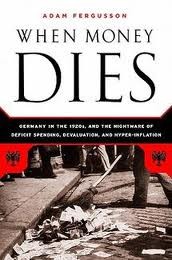Check nearby libraries
Buy this book

Presents a history of the 1923 German economic crisis that made the currency worthless, reduced the country to a barter economy, and left severe social unrest in its wake.
Check nearby libraries
Buy this book

Subjects
Inflation (Finance), Economic conditions, History, Germany| Edition | Availability |
|---|---|
|
1
When Money Dies: The Nightmare of Deficit Spending, Devaluation and Hyperinflation in Weimar Germany
2010, Public Affairs Press
1586489941 9781586489946
|
aaaa
|
Book Details
Classifications
Edition Identifiers
Work Identifiers
Source records
marc_openlibraries_sanfranciscopubliclibrary MARC recordBetter World Books record
Library of Congress MARC record
Internet Archive item record
Internet Archive item record
Promise Item
harvard_bibliographic_metadata record
Work Description
When Money Dies is the classic history of what happens when a nation's currency depreciates beyond recovery.
In 1923, with its currency effectively worthless (the exchange rate in December of that year was one dollar to 4,200,000,000,000 marks), the German republic was all but reduced to a barter economy. Expensive cigars, artworks, and jewels were routinely exchanged for staples such as bread; a cinema ticket could be bought for a lump of coal; and a bottle of paraffin for a silk shirt. People watched helplessly as their life savings disappeared and their loved ones starved. Germany's finances descended into chaos, with severe social unrest in its wake.
Money may no longer be physically printed and distributed in the voluminous quantities of 1923. However, "quantitative easing," that modern euphemism for surreptitious deficit financing in an electronic era, can no less become an assault on monetary discipline. Whatever the reason for a country's deficit -- necessity or profligacy, unwillingness to tax or blindness to expenditure -- it is beguiling to suppose that if the day of reckoning is postponed economic recovery will come in time to prevent higher unemployment or deeper recession. What if it does not? Germany in 1923 provides a vivid, compelling, sobering moral tale.
Community Reviews (0)
| September 18, 2021 | Edited by 0xtr | Added a description |
| September 25, 2020 | Edited by MARC Bot | import existing book |
| March 2, 2020 | Edited by MARC Bot | remove fake subjects |
| July 16, 2019 | Edited by MARC Bot | import existing book |
| February 24, 2012 | Created by 117.20.16.117 | Added new book. |











